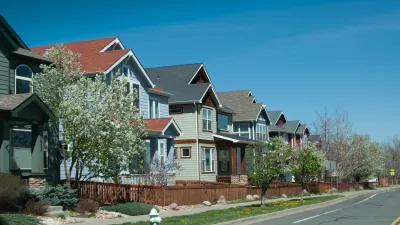After Oregon legalized 'missing middle housing' in cities statewide, Bend, the first city to comply with the state law, has experienced a significant boost in mid-density housing construction.

Upzoning efforts in Bend, Oregon have yielded unexpectedly positive results, reports Jack Hirsh, with 650 housing units currently under construction, compared to just 62 units built in the last six months. Local leaders attribute the boost in production to recent zoning code changes that permit more mid-density housing such as duplexes and fourplexes.
The changes at the city level are partly a response to a state bill passed in 2019 that downsized parking requirements for 'missing middle' housing types, essentially legalizing small multi-family buildings—what some call 'gentle density'—in many parts of the state. Bend became the first city with a population of over 25,000 to comply with the law, approving updated development codes that allowed duplexes, triplexes, and fourplexes in any single-family neighborhood in September 2021. The code changes, aimed at increasing housing affordability, also reduced parking requirements and added regulations for short-term rentals.
Across the country, the movement to legalize and stimulate the production of 'missing middle housing' is gaining ground as housing and density advocates look for ways to make living in cities more affordable and sustainable without encouraging sprawl and car-oriented development.
FULL STORY: Bend’s big shift from single-family homes to more multifamily housing tops city’s expectations

Planetizen Federal Action Tracker
A weekly monitor of how Trump’s orders and actions are impacting planners and planning in America.

Maui's Vacation Rental Debate Turns Ugly
Verbal attacks, misinformation campaigns and fistfights plague a high-stakes debate to convert thousands of vacation rentals into long-term housing.

Cuomo Is the Candidate of Both NIMBYs and Developers. What Gives?
In the New York City mayoral race, odd bedfellows align to preserve the housing status quo.

The Subversive Car-Free Guide to Trump's Great American Road Trip
Car-free ways to access Chicagoland’s best tourist attractions.

San Antonio and Austin are Fusing Into one Massive Megaregion
The region spanning the two central Texas cities is growing fast, posing challenges for local infrastructure and water supplies.

Charlottesville Temporarily Has No Zoning Code
A judge ordered the Virginia city to throw out its newly revised zoning code, leaving permitting for new development in legal limbo.
Urban Design for Planners 1: Software Tools
This six-course series explores essential urban design concepts using open source software and equips planners with the tools they need to participate fully in the urban design process.
Planning for Universal Design
Learn the tools for implementing Universal Design in planning regulations.
Heyer Gruel & Associates PA
JM Goldson LLC
Custer County Colorado
City of Camden Redevelopment Agency
City of Astoria
Transportation Research & Education Center (TREC) at Portland State University
Jefferson Parish Government
Camden Redevelopment Agency
City of Claremont





























